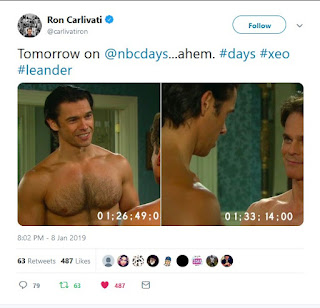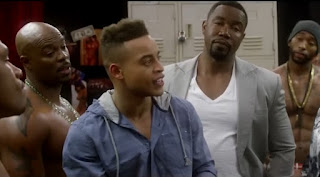TV Review - Living Biblically
In 2007, AJ Jacobs, a writer for Esquire magazine, published his book called The Year of Living Biblically: One Man's Humble Quest to Follow the Bible As Literally As Possible. In that book, Jacobs describes a year that he spent trying to follow all the rules and guidelines in the Bible. Patrick Walsh (2 Broke Girls and It's Always Sunny in Philadelphia) has adapted that book into this comedy series. It follows a movie critic at a newspaper in New York City who's married. In a short space, he learns his best friend has died and that his wife is pregnant. This prompts him to buy a Bible and follow its rules and guidelines to the letter.
This set-up is reminiscent of the recent film The Case for Christ (2017), the adaptation of Lee Strobel's book of the same name, directed by Jon Gunn, which follows a man who explores the Bible after learning his pregnant wife has converted to Christianity in the wake of a health scare. Strobel's book is way more serious than Jacobs' book, so the film adaptation is similarly way more serious than this TV adaptation. This TV adaptation by Walsh builds off the tone of Jacobs' book, which is a little tongue-in-cheek or slightly satirical. Walsh's adaptation takes that tone and runs with it. Having not read the book, I can't say how ridiculous or how satirical it gets, so I can't judge it totally against the book.
But, given the book is only a year in his life, I assume after that year, Jacobs stopped living biblically and went back to his normal, NYC routines, so by no means is Jacobs advocating that living biblically is a goal that we all should or even majority Christians should adopt. I assume that the point of the book is to show how stupid "living biblically" actually is, akin to what Morgan Spurlock did in Super Size Me (2004). Whether the book's point is to satirize the Bible or not, the TV series here doesn't seem to embrace that tactic. Walsh's series seems to argue that following the rules and guidelines whatever they might be is either superior or will yield more rewarding rewards. That taken to its logical conclusion is actually a scary proposition.
It was reported that Johnny Galecki (The Big Bang Theory) who is an executive producer on this project backed this series because he wondered about the lack of religion on TV. For Galecki to wonder that can only mean the 42-year-old, Emmy nominee clearly doesn't watch enough television. The star of this series appeared in ABC's The Real O'Neals, which was a series that put its Catholicism front-and-center and featured Jesus Christ as a character five times.
The CW's Jane the Virgin very much puts the Catholic faith of its characters front-and-center. Any TV show by Tyler Perry very much puts faith front-and-center. Greenleaf and Saints and Sinners are TV shows currently on about families who own churches. NBC's The Good Place is literally about Heaven and Hell and CW's Supernatural is also about angels and demons, so Galecki's wondering about the lack of religion on TV comes from a place of ignorance. Also, all the aforementioned shows are leagues above this one.
In the first episode here, Chip Curry, played by Jay R. Ferguson, decides to live according to the Bible and he finds that in Leviticus, it says that adulterers are to be stoned, ostensibly be put to death. Yet, his priest, Father Gene, played by Ian Gomez (Cougar Town and Felicity), tells Chip he's going to have to put a lot of people to death or at least hit a lot of people with stones. When Chip learns a friend is having an affair, he weighs stoning his friend, not enough though. He ends up throwing a rock at that friend and bruising him seriously. Now, in real life, Chip would have been arrested for assault, but what happens is that his friend says the stoning pushed him to go to counseling and try to fix his marriage.
Of course, this is a comedy and we're not meant to read too much into it, but the lesson is that stoning adulterers is the way to correct them. Stoning people should not be the corrective an American TV show should be advocating. It's a corrective that a TV show in Saudi Arabia, Sudan, Pakistan, Iraq or Iran would advocate, but not here in the United States. This series therefore is promoting a kind of religion extremism, which is fine if it were only about him, but when it becomes about stoning others and facing no repercussions, it gets dicey.
The show also gets into an equally dicey area of Biblical literalism or Biblical inerrancy, which is probably too complicated an issue for this series to tackle honestly, let lone thoroughly. The show instead seems to want to take certain Biblical rules and see how Chip tries to follow them, and if the show wasn't cowardly and came up with more clever or bold ways for Chip to undergo those Biblical rules, then maybe this show would be something.
For example, Episode 3 has Chip trying to follow the rule "Love Thy Neighbor." Chip's wife, Leslie, played by Lindsay Kraft, asks if loving thy neighbor means loving rapists and murderers, but that's brushed over for Cheryl, played by Sara Gilbert (Roseanne and The Talk), who is simply annoyingly talkative. It does veer briefly into the #MeToo Movement with a question of sexual harassment with Chip's love being perceived as inappropriate, but the show backs off that question really quickly. Having Chip confront an actual rapist, sexual harasser or murderer would have been braver than the weak tea this show tosses up.
Rated TV-PG-L.
Running Time: 30 mins.
Mondays at 9:30 PM on CBS.
This set-up is reminiscent of the recent film The Case for Christ (2017), the adaptation of Lee Strobel's book of the same name, directed by Jon Gunn, which follows a man who explores the Bible after learning his pregnant wife has converted to Christianity in the wake of a health scare. Strobel's book is way more serious than Jacobs' book, so the film adaptation is similarly way more serious than this TV adaptation. This TV adaptation by Walsh builds off the tone of Jacobs' book, which is a little tongue-in-cheek or slightly satirical. Walsh's adaptation takes that tone and runs with it. Having not read the book, I can't say how ridiculous or how satirical it gets, so I can't judge it totally against the book.
But, given the book is only a year in his life, I assume after that year, Jacobs stopped living biblically and went back to his normal, NYC routines, so by no means is Jacobs advocating that living biblically is a goal that we all should or even majority Christians should adopt. I assume that the point of the book is to show how stupid "living biblically" actually is, akin to what Morgan Spurlock did in Super Size Me (2004). Whether the book's point is to satirize the Bible or not, the TV series here doesn't seem to embrace that tactic. Walsh's series seems to argue that following the rules and guidelines whatever they might be is either superior or will yield more rewarding rewards. That taken to its logical conclusion is actually a scary proposition.
It was reported that Johnny Galecki (The Big Bang Theory) who is an executive producer on this project backed this series because he wondered about the lack of religion on TV. For Galecki to wonder that can only mean the 42-year-old, Emmy nominee clearly doesn't watch enough television. The star of this series appeared in ABC's The Real O'Neals, which was a series that put its Catholicism front-and-center and featured Jesus Christ as a character five times.
The CW's Jane the Virgin very much puts the Catholic faith of its characters front-and-center. Any TV show by Tyler Perry very much puts faith front-and-center. Greenleaf and Saints and Sinners are TV shows currently on about families who own churches. NBC's The Good Place is literally about Heaven and Hell and CW's Supernatural is also about angels and demons, so Galecki's wondering about the lack of religion on TV comes from a place of ignorance. Also, all the aforementioned shows are leagues above this one.
In the first episode here, Chip Curry, played by Jay R. Ferguson, decides to live according to the Bible and he finds that in Leviticus, it says that adulterers are to be stoned, ostensibly be put to death. Yet, his priest, Father Gene, played by Ian Gomez (Cougar Town and Felicity), tells Chip he's going to have to put a lot of people to death or at least hit a lot of people with stones. When Chip learns a friend is having an affair, he weighs stoning his friend, not enough though. He ends up throwing a rock at that friend and bruising him seriously. Now, in real life, Chip would have been arrested for assault, but what happens is that his friend says the stoning pushed him to go to counseling and try to fix his marriage.
Of course, this is a comedy and we're not meant to read too much into it, but the lesson is that stoning adulterers is the way to correct them. Stoning people should not be the corrective an American TV show should be advocating. It's a corrective that a TV show in Saudi Arabia, Sudan, Pakistan, Iraq or Iran would advocate, but not here in the United States. This series therefore is promoting a kind of religion extremism, which is fine if it were only about him, but when it becomes about stoning others and facing no repercussions, it gets dicey.
The show also gets into an equally dicey area of Biblical literalism or Biblical inerrancy, which is probably too complicated an issue for this series to tackle honestly, let lone thoroughly. The show instead seems to want to take certain Biblical rules and see how Chip tries to follow them, and if the show wasn't cowardly and came up with more clever or bold ways for Chip to undergo those Biblical rules, then maybe this show would be something.
For example, Episode 3 has Chip trying to follow the rule "Love Thy Neighbor." Chip's wife, Leslie, played by Lindsay Kraft, asks if loving thy neighbor means loving rapists and murderers, but that's brushed over for Cheryl, played by Sara Gilbert (Roseanne and The Talk), who is simply annoyingly talkative. It does veer briefly into the #MeToo Movement with a question of sexual harassment with Chip's love being perceived as inappropriate, but the show backs off that question really quickly. Having Chip confront an actual rapist, sexual harasser or murderer would have been braver than the weak tea this show tosses up.
Rated TV-PG-L.
Running Time: 30 mins.
Mondays at 9:30 PM on CBS.













Comments
Post a Comment